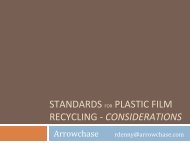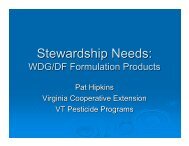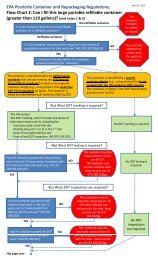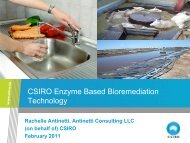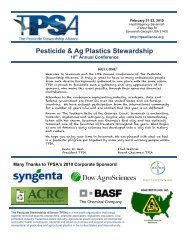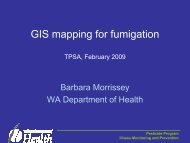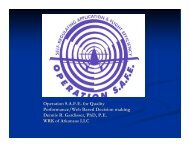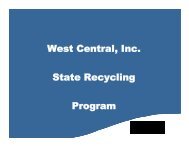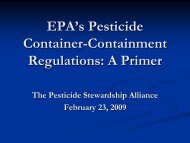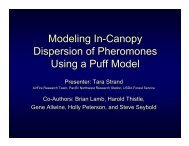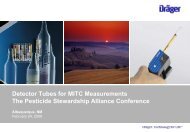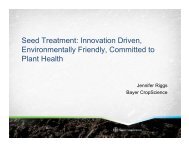- Page 1 and 2:
ForewordThe states and some countie
- Page 3 and 4:
Table of ContentsSECTIONFOREWORDTAB
- Page 5 and 6:
List of Figures and TablesNumber Ti
- Page 7 and 8:
State IndexAlabamaAlaskaArizonaArka
- Page 9 and 10:
Executive SummaryParticipants. Alth
- Page 11 and 12:
Executive Summarypounds. States wan
- Page 14 and 15:
Section 1 IntroductionFor the past
- Page 16:
The Clean Sweep Reportshort-term or
- Page 19 and 20:
Section 1 Introductionextensive and
- Page 21 and 22:
Section 1 Introductionfunded, conti
- Page 23 and 24:
Section 2 Clean Sweep Program Opera
- Page 25 and 26:
Section 2Clean Sweep Program Operat
- Page 27 and 28:
Section 2 Clean Sweep Program Opera
- Page 29 and 30:
Section 2 Clean Sweep Program Opera
- Page 31 and 32:
Section 2 Clean Sweep Program Opera
- Page 33 and 34:
Section 2 Clean Sweep Program Opera
- Page 35 and 36:
Section 2Clean Sweep Program Operat
- Page 37 and 38:
Section 2 Clean Sweep Program Opera
- Page 39 and 40:
Section 2 Clean Sweep Program Opera
- Page 41 and 42:
Section 2 Clean Sweep Program Opera
- Page 43 and 44:
Section 2 Clean Sweep Program Opera
- Page 45 and 46:
Section 3 Clean Sweep Program Resul
- Page 47 and 48:
Section 3 Clean Sweep Program Resul
- Page 49 and 50:
Section 3 Clean Sweep Program Resul
- Page 51 and 52:
Table 11 Total Amount of Pesticides
- Page 53 and 54:
Section 3 Clean Sweep Program Resul
- Page 55 and 56:
Section 3 Clean Sweep Program Resul
- Page 57 and 58:
44Table 13 Specific Pesticides Trac
- Page 59 and 60:
Table 14 Quantity of the Most Commo
- Page 61 and 62:
Section 4 Challenges and Opportunit
- Page 63 and 64:
Section 4 Challenges and Opportunit
- Page 65 and 66:
Section 4 Challenges and Opportunit
- Page 67 and 68:
Section 4 Challenges and Opportunit
- Page 69 and 70:
Section 4 Challenges and Opportunit
- Page 71 and 72:
Section 5 Observations5.2 The unit
- Page 73 and 74:
Section 5ObservationsTable 17: Tota
- Page 75 and 76:
Section 5 Observations5.3 Reliable
- Page 77 and 78:
Section 5 Observationsamount annual
- Page 79 and 80:
Appendix INOTES on STATE “ATA GLA
- Page 81 and 82:
ALABAMA AT A GLANCESince 1994 Alaba
- Page 83 and 84:
ALASKA AT A GLANCEAlaska conducts s
- Page 85 and 86:
ARIZONA AT A GLANCEArizona does not
- Page 87 and 88:
ARKANSAS AT A GLANCEThe Arkansas St
- Page 89 and 90:
CALIFORNIA AT A GLANCESince 1989 Ca
- Page 91 and 92:
COLORADO AT A GLANCEAn EPA grant an
- Page 93 and 94:
YearColorado Table 1 - Quantity of
- Page 95 and 96:
Summary of Connecticut Waste Pestic
- Page 97 and 98:
Summary of Delaware Waste Pesticide
- Page 99 and 100:
Summary of Florida Waste Pesticide
- Page 101 and 102:
GEORGIA AT A GLANCEGeorgia has cond
- Page 103 and 104:
HAWAII AT A GLANCEHawaii conducted
- Page 105 and 106:
IDAHO AT A GLANCEIdaho’s permanen
- Page 107 and 108:
ILLINOIS AT A GLANCESince its first
- Page 109 and 110:
Illinois attempted a swap program i
- Page 111 and 112:
Summary of Indiana Waste Pesticide
- Page 113 and 114:
IOWA AT A GLANCESince 1991 Iowa has
- Page 115 and 116:
YearIowa Table 1 - Quantity of Pest
- Page 117 and 118:
Summary of Kansas Waste Pesticide D
- Page 119 and 120:
KENTUCKY AT A GLANCEKentucky conduc
- Page 121 and 122:
LOUISIANA AT A GLANCELouisiana coll
- Page 123 and 124: MAINE AT A GLANCEMaine conducted it
- Page 125 and 126: MARYLAND AT A GLANCEThe Maryland De
- Page 127 and 128: MASSACHUSETTS AT A GLANCEMassachuse
- Page 129 and 130: MICHIGAN AT A GLANCEMichigan’s pe
- Page 131 and 132: MINNESOTA AT A GLANCESince 1989 Min
- Page 133 and 134: Minnesota Table 1 - Quantity of Pes
- Page 135 and 136: Summary of Mississippi Waste Pestic
- Page 137 and 138: Summary of Missouri Waste Pesticide
- Page 139 and 140: Summary of Montana Waste Pesticide
- Page 141 and 142: Summary of Nebraska Waste Pesticide
- Page 143 and 144: Summary of Nevada Waste Pesticide D
- Page 145 and 146: Summary of New Hampshire Waste Pest
- Page 147 and 148: Summary of New Jersey Waste Pestici
- Page 149 and 150: New Jersey Table 3 - County-by-Coun
- Page 151 and 152: Summary of New Mexico Waste Pestici
- Page 153 and 154: Summary of New York Waste Pesticide
- Page 155 and 156: churches, schools and businesses. P
- Page 157 and 158: NORTH CAROLINA AT A GLANCENorth Car
- Page 159 and 160: North Carolina Table 1 - Quantity o
- Page 161 and 162: Summary of North Dakota Waste Pesti
- Page 163 and 164: Summary of Ohio Waste Pesticide Dis
- Page 165 and 166: OKLAHOMA AT A GLANCEOklahoma does n
- Page 167 and 168: OREGON AT A GLANCESince 1991 Oregon
- Page 169 and 170: PENNSYLVANIA AT A GLANCEIn 1993 Pen
- Page 171 and 172: RHODE ISLAND AT A GLANCERhode Islan
- Page 173: SOUTH CAROLINA AT A GLANCESouth Car
- Page 177 and 178: TENNESSEE AT A GLANCEThe Tennessee
- Page 179 and 180: TEXAS AT A GLANCESince 1992 Texas h
- Page 181 and 182: YearNumberof SitesTexas Table 1 - Q
- Page 183 and 184: UTAH AT A GLANCESince 1993 Utah has
- Page 185 and 186: VERMONT AT A GLANCEVermont first co
- Page 187 and 188: VIRGINIA AT A GLANCEVirginia conduc
- Page 189 and 190: YearQuantity ofPesticides(pounds)Vi
- Page 191 and 192: Summary of Washington Waste Pestici
- Page 193 and 194: Summary of West Virginia Waste Pest
- Page 195 and 196: Summary of Wisconsin Waste Pesticid
- Page 197 and 198: WYOMING AT A GLANCEIn 1992 Wyoming
- Page 199 and 200: Appendix II - Pesticides That are R
- Page 201 and 202: Appendix IIU044 chloroform U080 met
- Page 203 and 204: Appendix IIIB. Availability Contrac
- Page 205 and 206: Appendix III4. Federal Hazardous Ma
- Page 207 and 208: Appendix III22. INDEPENDENT CONTRAC
- Page 209 and 210: Appendix IIIContractor further agre
- Page 211 and 212: Appendix III33. CONTRACTOR’S DUTI
- Page 213 and 214: Appendix IIIC. Any deviation of mor
- Page 215 and 216: Appendix III45. MERGER CLAUSEThis a
- Page 217 and 218: Appendix IVOnyx Environmental Servi
- Page 219 and 220: State Pre-89 1989 1990 1991 1992 19
- Page 221 and 222: State pre-89 1989 1990 1991 1992 19
- Page 223 and 224: Appendix VILouisiana: Division of P
- Page 225 and 226:
Appendix VII - Sample Emergency Pla
- Page 227 and 228:
Appendix VIIICOMPARISON OF PESTICID
- Page 229:
StateEstimated(lbs. A.I.)Total Used



